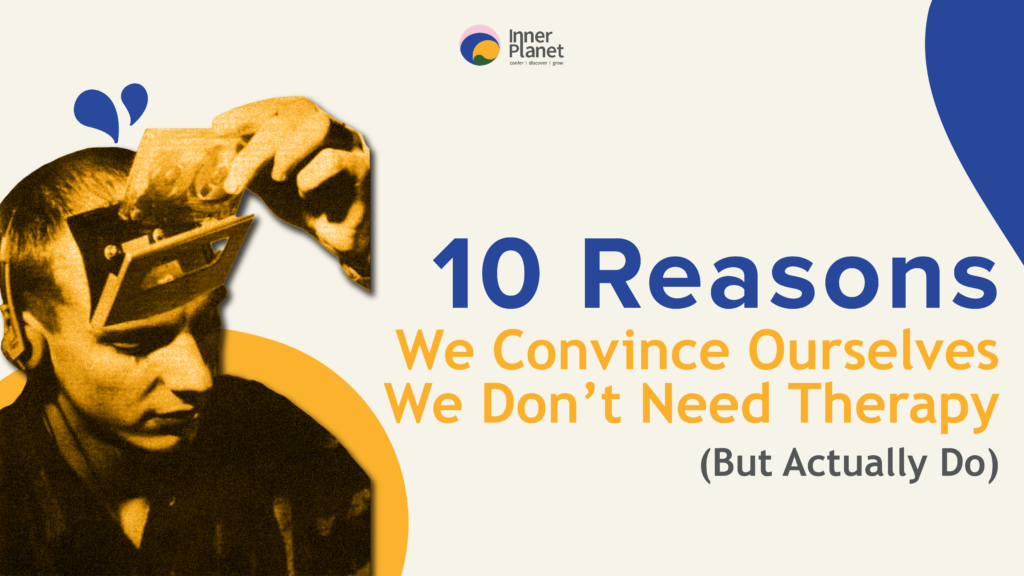Many of us struggle with the idea of seeking therapy. We all have moments where we convince ourselves that therapy isn’t for us—life seems manageable, and we’ve made it this far without professional mental health care. But beneath these justifications, there’s often a deeper hesitation: fear of vulnerability, uncertainty about change, or the belief that our struggles aren’t “serious enough.” Therapy isn’t just for moments of crisis; it’s an opportunity to explore our emotions, recognize patterns, and build the tools to navigate life with greater clarity and resilience. Here are ten common reasons people use to avoid therapy—and why they might actually be signs that therapy is exactly what they need.
1. “Things Aren’t THAT Bad”
It’s easy to compare our struggles to others and think, “At least I don’t have it as bad as them.” But pain is not a competition, and struggles are valid regardless of their severity. Therapy isn’t just for crises; it can help with managing daily stress, processing emotions, and building resilience. Preventative mental health care is just as important as seeking help in times of distress.
2. “I Can Handle It on My Own”
Many people believe they should be strong enough to deal with their emotions without help. However, carrying emotional burdens alone can lead to burnout, loneliness, and mental exhaustion. Therapy provides a safe space to explore your thoughts and emotions with guidance, offering new strategies to navigate life’s challenges. Seeking support is not a sign of weakness—it’s an act of self-care.
3. “Therapy is Too Expensive”
Therapy can feel like a significant investment, but prioritizing your mental health is just as crucial as caring for your physical well-being. Many people don’t hesitate to spend on gym memberships or personal trainers, recognizing the long-term benefits of physical fitness—mental health deserves the same level of commitment. To make therapy more accessible, some organizations offer multiple pricing options and bulk session plans, ensuring long-term support is within reach. Investing in therapy ultimately means investing in a healthier, more balanced future.
4. “I Don’t Have the Time”
In today’s fast-paced world, prioritizing mental health can feel impossible. However, even one hour weekly or bi-weekly in therapy can lead to long-term improvements in your well-being, productivity, and relationships. Many therapists offer flexible scheduling, including evening or online sessions. Prioritizing mental health can make other aspects of life feel more manageable, ultimately saving you time and energy.
5. “Therapists Just Tell You What You Already Know”
A good therapist doesn’t simply repeat what you already think—they challenge you to see things from new perspectives. They help you identify unhealthy patterns, break cycles, and develop actionable solutions. Even if you think you know the answers, having a professional guide you through them can be incredibly validating and transformative.
6. “Talking About My Problems Won’t Fix Them”
Therapy is not just about talking—it’s about learning. Through therapy, you develop tools to cope with stress, improve communication, set boundaries, and process emotions in a healthier way. Understanding your triggers and reactions can empower you to make positive changes that lead to long-term emotional well-being.
7. “I Don’t Want to Dwell on the Past”
While therapy may involve discussing past experiences, the goal is not to dwell but to understand and heal. The past shapes our present, and recognizing patterns can help us break free from cycles that no longer serve us. Therapy helps you move forward with greater self-awareness and control over your emotional responses.
8. “I Should Be Grateful for What I Have”
Gratitude and mental health are not mutually exclusive. You can be grateful for your life and still struggle with emotional distress. Therapy allows you to explore complex emotions without guilt, providing you with the tools to manage them effectively. It’s okay to seek help even if you’re grateful for a lot of things in your life.
9. “Only People With Serious Mental Health Issues Need Therapy”
Therapy is beneficial for everyone, not just those with diagnosed mental health conditions. It can help with career stress, relationship struggles, self-esteem issues, and overall emotional well-being. Seeking therapy is not about having a “problem”—it’s about wanting to grow and improve your mental health just as you would with physical health.
10. “I Tried Therapy Before, and It Didn’t Work”
No single therapist or therapeutic approach can prove helpful for all clients, and all problems. If your past therapy experience wasn’t helpful, it doesn’t mean therapy won’t work for you—it means you might need a different therapist or method. Therapy is a highly personal journey, and finding the right match can make all the difference. Don’t let one experience discourage you from trying again.
If any of these reasons sound familiar, it might be time to reconsider your stance on therapy. Seeking help is not an admission of failure—it’s a commitment to your own well-being. Therapy provides invaluable tools to navigate life’s challenges, improve emotional resilience, and foster meaningful personal growth. You deserve the opportunity to thrive, and therapy can help you get there. If you ever need support, remember that help is always within reach – we’re just a call away!


